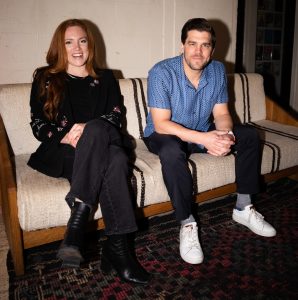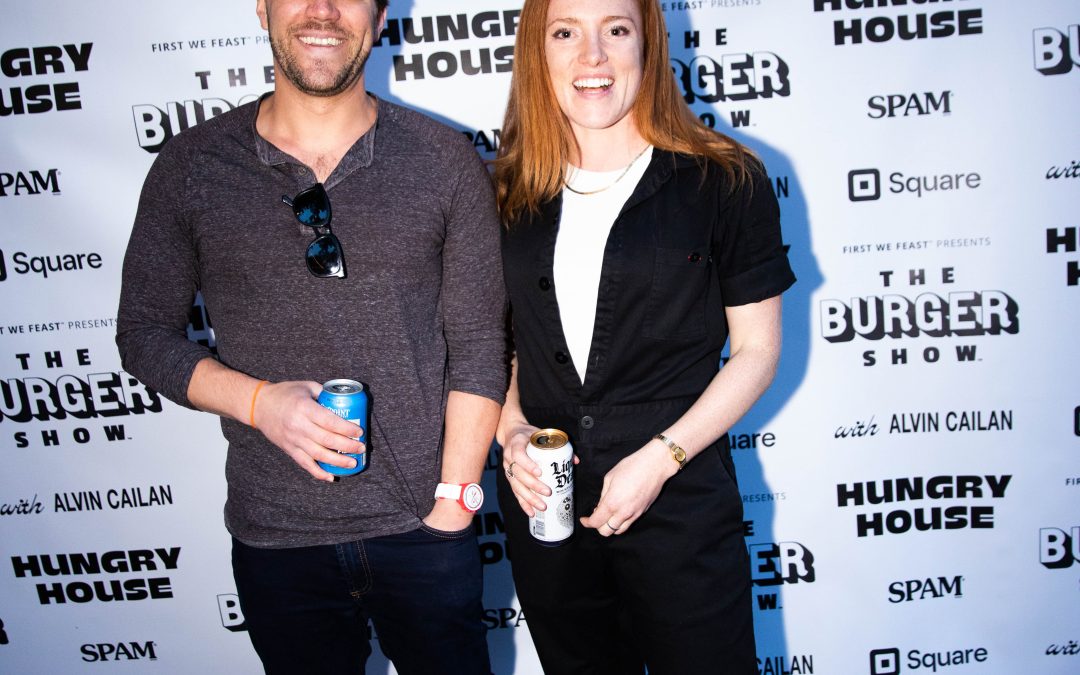Hungry House founder Kristen Barnett is moving from her “anti-ghost kitchen” concept to something entirely new, but largely focused on the same cohort of culinary creators who have their own built-in followings in the F&B universe.

Culinary Creators Worldwide co-founders Kristen Barnett and Trevor Kerin.
Based in New York and steeped in a familiar blend of experiential glam and food-based celebrity as Hungry House, the new firm is called Culinary Creators Worldwide—and it might prove equally complex to describe in a nutshell to prospective clients and investors.
Whereas Hungry House wasn’t technically a ghost kitchen but was a space for unaffiliated chefs to build their business without the ball-and-chain of expensive real estate, CCW could be described as an anti-agency that also employs an asset-light model. Hungry House will continue onward with internal co-founders stepping up into C-level roles, which have yet to be determined.
This new concept bridges the gap between top restaurants and food brands, culinary all-stars and modern food-tech to create what it calls “ground-breaking” activations and partnerships—a mash-up between good taste, good food and good people, all hopefully having a good time.
Barnett is no newcomer to the bleeding edge of restaurants and delivery. She was the chief operating officer of New York-based Zuul before it was acquired by Kitchen United in 2021. While leading Hungry House, the concept gained industry visibility as a fresh take on shared kitchen spaces without the inherent challenges of real estate ownership.
For her next act, she’s trusting her gut while betting big on the combined power of personality and partnerships in the setting of one-time events and ongoing media campaigns.
A new idea in choppy seas

Brand “activations” in motion.
Before diving into the nuts and bolts of the new startup, I asked Barnett what she made of recent industry headlines that have caused most food-tech investors to clam up as some of the biggest category brands experienced layoffs, unexpected acquisitions and general downsizing.
“Everything that’s played out for me has been very reaffirming of the fundamentals I’ve tried to stay true to for the last two years since starting Hungry House,” she said. “I always focused on what Hungry House was doing right versus taking too heavy-handed an approach comparing ourselves to other businesses.”
Pressed to clarify, Barnett said this current moment is “bittersweet” for the industry, but one that underscores her core beliefs of what makes a solid business model. Listing some recent examples, she pointed to “a lot of unnecessary pain caused by these overblown investor expectations.”
“It points to the fact that you have to build a business on good fundamentals and, unfortunately, if that’s in the food industry you need to be involved in the business of good food and stuff people actually want—that’s a really important fundamental to go back on,” she added.
She was careful to note that she’s not taking a victory lap or unsympathetic to long-term friends in the industry, stressing that Hungry House is still a small business compared to many national players.
Barnett said she’s learned a lot about herself over the last two years, including her drive to take on challenging missions and “fight like hell to get things done.” Aside from everything that’s happened across the restaurant and delivery spaces in recent years, she added that there’s clearly demand for programming that marries creators with the kinds of content big brands are looking to engage customers with.
“It definitely hasn’t been easy,” Barnett said. “I felt like I needed to prove to the world and maybe also myself that technology and all these cool things could be used for something artistic and beautiful and creative and beneficial to chefs and customers in a way that I felt like my peers were not.”
Emerging opportunities

An outtake from First We Feast’s The Burger Show, sponsored by Spam and Square.
The business model for Culinary Creators Worldwide grew out of learnings gleaned through Hungry House’s Netflix-like “seasons” where new chefs, dishes and collaborations were intentionally released on a rolling schedule.
Rather than score some buzz around its tenant lineup, like new ghost kitchens and food halls, Hungry House was based on the idea that culinary choices should always be rotating for change’s sake.
Through those years, two major opportunities emerged. One, that this new generation of Instagram-inflated culinary creators needed infrastructure to take their projects to the next level and reach scale. Second, Barnett said, brands of many kinds wanted to work with Hungry House to promote their own projects, or to create something entirely new in partnership with up-and-coming celebrities with their own fanbases.
“People just kept coming to Hungry House [wanting to work with us] and offering us six-figure deals to promote their products using our chefs, using our content creation, using our parties,” Barnett said. “I realized I had created a very operationally intensive, real estate-intensive experiential marketing engine—and there’s a ton of potential to actually leverage the F&B industry as experiential marketing.”
For Barnett, this new idea meant “unlocking a ton more value” at 30-40 percent margins versus the typical 10 percent margin of selling food.”
“I ultimately realized it had to be a separate company, because you can’t have an agency and a ghost kitchen wrapped up in the same entity,” Barnett said. “I realized there was this great gap, and that food and an agency that specializes in it can connect those dots really well, either through the events themselves or just producing really great content around food, so it’s a niche in and of itself.”
With an agency-style foundation, the new company will look to build upon collaborations Barnett was involved with, including a landmark Hungry House deal that connected food media company First We Feast with Square, Spam and rising celebrity chef Alvin Cailan who is especially well known in America’s Filipino food scene.
The partnership, CCW’s first tangible product, centered around a limited-time burger menu available to order via Hungry House. It was inspired by First We Feast’s “The Burger Show,” and included a four-party YouTube series that ran throughout May, which is National Burger Month.
Spam and Square signed on as sponsors of the campaign, as Hungry House and Alvin both use Square as their POS and online ordering system. Spam’s inclusion was more physical, showcasing a known chef using their signature product as part of one of the menu items.
The whole deal “unlocked a ton of value for all parties involved,” Barnett said, while also driving sales and awareness for Hungry House’s fifth season.
Much like Barnett and company said when pitching Hungry House, the new company is designed around talented chefs whose end goal isn’t necessarily restaurant ownership.
“It’s often inefficient for brands to work with the [talent] managers or agents, they all have different rates and processes, and the creators themselves don’t have the resources to run broader campaigns themselves,” Barnett said. “On the flip side, creators were coming to me expressing a desire to win more deals. We see ourselves connecting the dots to provide that infrastructure for creators to be able to do just that.
Monetizing influence
 Barnett pointed to countless opportunities for similar cooperative deals across the foodservice world, including with a large indoor vertical farming company that is interested in marketing to gain visibility, ideally through partnerships with restaurants and culinary creators to tell the story of their products.
Barnett pointed to countless opportunities for similar cooperative deals across the foodservice world, including with a large indoor vertical farming company that is interested in marketing to gain visibility, ideally through partnerships with restaurants and culinary creators to tell the story of their products.
“We’re not always going to be putting together a tech company, an institutional company and a food media brand…but what we do see being the core of our business is working with large companies that want really creative, food-focused strategies to tell the story of their products,” she said.
Asked where she hopes to see CCW in the coming years, Barnett says they are focused on “taking on the right projects and the best projects, versus saying yes to everything, and building from there.”
“Ultimately, I want to have a very successful, multi-million-dollar business, but I want it to be the right business that I feel completely aligned to,” she said. “With that type of expertise and the ability to really crack open the food-tech market to take it to another level with my background, that’s where we believe is an untapped niche in the market.”


